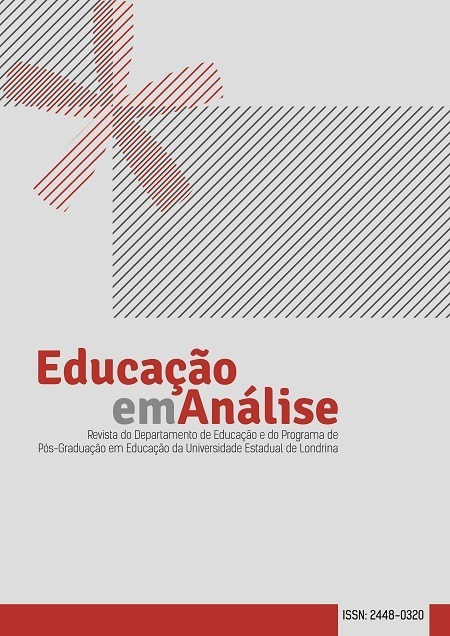Behavioral attitude of young people of the digital generation, facing the learning processes
DOI:
https://doi.org/10.5433/1984-7939.2023v8n1p268Keywords:
Digital Culture, Teaching-Learning, Awareness, Digital NativesAbstract
The objective of this study is to understand the behavioral posture of today's youth in relation to the learning processes and to evaluate the teaching mechanisms in the face of the challenges arising from this new digital age. Its methodology was structured from a bibliographic review, with the qualitative research method, of an analytical and descriptive nature for the investigation of reality, through the discussions present in the articles selected for review. The research problem was: how can schools mediate the positive and negative aspects of the use of technologies and their impact on the acquisition of knowledge and mental health? The results show the digital network as an open field, which offers physical protection when considering human distance, however, it becomes a virtual space propitious to offenses, prejudices, judgments, and criticism. The negative charge of this information can be severely harmful to young people, generating a strong reaction in their mental health, at the same time that the benefits of the use of technology are countless, being of utmost importance to consider that there are advantages and risks to be evaluated. We conclude that it is essential to offer young people a good education to stabilize ethical postures based on awareness and the development of knowledge that contributes to the current scenario.
Downloads
References
AZEVEDO, Daniela Simone de; SILVEIRA, Aleph Campos da; LOPES, Carla Oliveira; AMARAL, Ludmila de Oliveira; GOULART, Ilsa do Carmo Vieira; MARTINS, Ronei Ximenes. Letramento digital: uma reflexão sobre o mito dos “Nativos Digitais”. RENOTE, Porto Alegre, v. 16, n. 2, p. 615–625, 2018. Disponível em: https://seer.ufrgs.br/renote/article/view/89222 Acesso em: 25 jan. 2023. DOI: https://doi.org/10.22456/1679-1916.89222
BITENCOURTE, Andreia; HINZ, Verlani Timm; LOPES, João Ladislau Barbará. Uma análise do uso das tecnologias móveis digitais em sala de aula no ensino médio de uma escola pública. Educar mais, Rio Grande do Sul, v. 2, n. 1, p. 1-23, 2018. Disponível em: https://periodicos.ifsul.edu.br/index.php/educarmais/article/view/1273 Acesso em: 25 fev. 2023.
BOERS, Elroy; AFZALI, Mohammad H.; NEWTON, Nicola; CONROD, Patricia. Association of Screen Time and Depression in Adolescence. Jama Pediatrics, [Canadá], v. 173, n. 9, p. 853-859, 2019. Disponível em: https://jamanetwork.com/journals/jamapediatrics/fullarticle/2737909?resultClick=1. Acesso em: 12 fev. 2023. DOI: https://doi.org/10.1001/jamapediatrics.2019.1759
BRASIL é 2º em ranking de países que passam mais tempo em redes sociais. Época Negócios, [São Paulo], 6 set. 2019. Disponível em: https://epocanegocios.globo.com/Tecnologia/noticia/2019/09/brasil-e-2-em-ranking-de-paises-que-passam-mais-tempo-em-redes-sociais.html#:~:text=Globalmente%2C%20as%20pessoas%20gastam%20quase%20150%20minutos%20por%20dia%20nas%20m%C3%ADdias%20sociais&text=Uma%20nova%20pesquisa%20detectou%20que,m%C3%A9dia%20nos%20%C3%BAltimos%20sete%20anos. Acesso em: 14 fev. 2023.
BRASIL. Ministério da Saúde. Perfil epidemiológico das tentativas e óbitos por suicídio no Brasil e a rede de atenção à saúde. Boletim epistemológico, [s. l.], v. 48, n. 30, p. 1-15, 2017. Disponível em: https://www.gov.br/saude/pt-br/centrais-de-conteudo/apresentacoes/2017/2017-025-perfil-epidemiologico-das-tentativas-e-obitos-por-suicidio-no-brasil-e-a-rede-de-aten-ao-a-sa-de-pdf. Acesso em: 25 fev. 2023.
BRUNO, Adriana Rocha. Aprendizagens em ambientes virtuais: plasticidade na formação do adulto educador. Revista Ciências e Cognição, Rio de Janeiro, v. 15, n. 1, p. 43-54, 2010. Disponível em: http://pepsic.bvsalud.org/scielo.php?pid=S1806-58212010000100005&script=sci_abstract. Acesso em: 25 fev. 2023.
CABRA-TORRES, Fabiola; MARCIALES-VIVAS, Glória Patrícia. Mitos, realidades y preguntas de investigación sobre los ‘nativos digitales’: una revisión. Universitas Psychologica, Bogotá, v. 8, n. 2, p. 323-338, 2009. Disponível em: https://www.redalyc.org/pdf/647/64712165004.pdf. Acesso em: 25 fev. 2023.
CASTRO, Gisela. Screenagers: entretenimiento, comunicaión y consumo em la cultura digital. Meios y Enteros, Rosario, n. 11, 26 nov. 2012. Disponível em: https://mediosyenteros.unr.edu.ar/screenagers-entretenimiento-comunicacion-y-consumo-en-la-cultura-digital/. Acesso em: 23 fev. 2023.
CORTELAZZO, Iolanda Bueno de Camargo. Inovações tecnológicas na educação profissional para o empreendedorismo e empregabilidade. PIÉSIS, Balneário Camboriú, p. 1-19, 2016. Disponível em: https://research.amanote.com/publication/JJjS2nMBKQvf0Bhi9xda/inovaes-tecnolgicas-na-educao-profissional-para-o-empreendedorismo-e-empregabilidade. Acesso em: 25 fev. 2023.
COUGHLAN, Sean. 1 em cada 4 jovens está viciado em celular, aponta estudo britânico. BBC News Brasil, [s. l.], 29 nov. 2019. Disponível em: https://www.bbc.com/portuguese/geral-50599245 Acesso em: 12 fev. 2023.
DEMO, Pedro. Olhar do educador e novas tecnologias. Boletim Técnico do Senac: Revista de Educação Profissional, Rio de Janeiro, v. 37, n. 2, p. 15-26, 2011. Disponível em: https://www.bts.senac.br/bts/article/view/190. Acesso em: 15 jan. 2023.
EISNER, Susan P. Managing Generation Y. SAM Advanced Management Journal, Cincinnati, v. 70, n. 4, p. 4-15, 2005. Disponível em: https://www.proquest.com/openview/7849d64fa1ba86e9b24f77f9b3e89d16/1?pq-origsite=gscholar&cbl=40946. Acesso em: 20 jan. 2023.
FRANCO, Claudio de Paiva. Understanding digital natives’ learning experiences. Revista brasileira de linguística aplicada, Belo Horizonte, v. 13, n. 2, p. 643-658, 2013. Disponível em: https://www.scielo.br/j/rbla/a/pPL56WH7zHMLzBgzBZBDRyL/abstract/?lang=en. Acesso em: 29 jan. 2023. DOI: https://doi.org/10.1590/S1984-63982013005000001
HOSPITAL SANTA MÔNICA. Impacto da tecnologia na saúde mental dos jovens: um sinal de alerta. Hospital Santa Mônica, São Paulo, 6 dez. 2019. Disponível em: https://hospitalsantamonica.com.br/impacto-da-tecnologia-na-saude-mental-dos-jovens-um-sinal-de-alerta/. Acesso em: 12 fev. 2023.
KAMPF, Cristiane. A geração Z e o papel das tecnologias digitais na construção do pensamento. ComCiência, Campinas, n. 131, 2011. Disponível em: http://comciencia.scielo.br/scielo.php?script=sci_arttext&pid=S1519-76542011000700004&lng=en&nrm=iso. Acesso em: 15 ago. 2022.
LOH, Kep Kee; KANAI, Riota. How has the Internet reshaped human cognition? Neuroscientist, Thousand Oaks, v. 22, n. 5, p. 506-520, 2016. Disponível em: https://pubmed.ncbi.nlm.nih.gov/26170005/. Acesso em: 15 ago. 2022. DOI: https://doi.org/10.1177/1073858415595005
MARÔPO, Lídia; SAMPAIO, Inês Vitorino; MIRANDA, Nut. Meninas no YouTube: participação, celebrização e cultura do consumo. Estudos em Comunicação, Covilhã, v. 1, n. 26, p. 175-195, 2018. http://ojs.labcom-ifp.ubi.pt/index.php/ec/article/view/402. Acesso em: 17 ago. 2022 DOI: https://doi.org/10.20287/ec.n26.v1.a10
MELLO, Katia; VICÁRIA, Luciana. Os filhos da era digital: Como o uso do computador está transformando a cabeça das crianças – e como protegê-las das ameaças da internet. Revista Época, [s. l.], n. 486, p. 82-90, 2008. Disponível em: https://revistaepoca.globo.com/Revista/Epoca/0,,EDR78998-6014,00.html. Acesso em: 25 ago. 2022
OMS - ORGANIZAÇÃO MUNDIAL DE SAÚDE. Mental health of adolescents. Geneva: OMS, 2021. Disponível em: https://www.who.int/news-room/fact-sheets/detail/adolescent-mental-health. Acesso em: 15 fev. 2023.
OTHON, Renata Alves de Albuquerque; COELHO, Maria das Graças Pinto. Retratos da “Geração Digital”: um estudo exploratório sobre o consumo midiático e a sociabilidade em Rede na Infância. Comunicação & Sociedade, São Bernardo do Campo, v. 42, n. 3, p. 139-166, 2020. Disponível em: https://xjournals.com/collections/articles/Article?qt=zuyq0i8G98gwIct1PoPJIvdhR/twOQYrkQgnYRH0mGn7FSwH5xKcZjAjFVMEmOwM. Acesso em: 15 mar. 2023. DOI: https://doi.org/10.15603/2175-7755/cs.v42n3p139-166
PATELA, Nelma. O perfil geracional dos alunos de hoje: Repto à Emergência de novas Teorias Educativas. E-Revista de Estudos Interculturais do CEI, Porto, n. 4, p. 20, 2016. Disponível em: https://www.iscap.pt/cei/e-rei/n4/artigos/Nelma-Patela_O-Perfil-Geracional-dos-Alunos-de-Hoje.pdf. Acesso em: 25 ago. 2022
PRENSKY, Marc. Digital natives, digital imigrants. MCB University Press, Binglei, v. 9, n. 5, p. 1-6, 2001. Disponível em: https://www.marcprensky.com/writing/Prensky%20-%20Digital%20Natives,%20Digital%20Immigrants%20-%20Part1.pdf. Acesso em: 25 ago. 2022 DOI: https://doi.org/10.1108/10748120110424816
PRENSKY, Marc. Não me atrapalhe, mãe – Eu estou aprendendo: como os videogames estão preparando nossos filhos para o sucesso no século XXI: e como você pode ajudar!. Tradução de Lívia Bergo. São Paulo: Phorte, 2010. Disponível em: https://issuu.com/phorteeditora/docs/nao_me_atrapalhe_mae. Acesso em: 25 ago. 2022
PRZYBYLSKI, Andrey K.; ORBEN, Amy; WEINSTEIN, Netta. How Much Is Too Much? Examining the Relationship Between Digital Screen Engagement and Psychosocial Functioning in a Confirmatory Cohort Study. J Am Acad Child Adolesc Psychiatry, Canadá, v. 59, n. 9, p. 1080-1088, 2020. Disponível em: https://pubmed.ncbi.nlm.nih.gov/31400437/. Acesso em: 10 fev. 2023. DOI: https://doi.org/10.1016/j.jaac.2019.06.017
REVISTA DO HOSPITAL ALEMÃO OSWALDO CRUZ LEVE. [S. l.]: Oswaldo Cruz, jun./ago. 2018. Disponível em:https://www.hospitaloswaldocruz.org.br/wp-content/uploads/2018/09/2018_0921-LEVE-7-_sem-marcas_low.pdf Acesso em: 12 fev. 2023.
SOHN, Sei Yon; REES, Philippa, WILDRIDGE, Bethany; KALK, Nicola J.; CARTER, Ben. Prevalence of problematic smartphone usage and associated mental health outcomes amongst children and young people: a systematic review, meta-analysis and GRADE of the evidence. BMC Psychiatry, [London], v. 19, n. 356, p. 1-10, 2019. DOI: https://doi.org/10.1186/s12888-019-2350-x. DOI: https://doi.org/10.1186/s12888-019-2350-x
SANTOS, Edméa; WEBER, Aline. Educação e cibercultura: aprendizagem ubíqua no currículo da disciplina didática. Revista Diálogo Educacional, Curitiba, v. 13, n. 38, 2013. Disponível: http://educa.fcc.org.br/scielo.php?script=sci_abstract&pid=S1981-416X2013000100014&lng=pt&nrm=iso. Acesso em: 10 fev. 2023. DOI: https://doi.org/10.7213/dialogo.educ.7646
SOARES, Marijane de Oliveira; PORTO, Ana Paula Teixeira. Expectativas de alunos do Ensino Médio de Rondonópolis-MT quanto ao uso de tecnologias digitais na sua formação. ReTER, Santa Maria, v. 2, n. 1, 2021. Disponível em: https://periodicos.ufsm.br/reter/article/view/65201. Acesso em: 25 ago. 2022.
SOHN, Sei Yon; REES, Philippa; WILDRIDGE, Bethany; KALK, Nicola J.; CARTER, Ben. Prevalence of problematic smartphone usage and associated mental health outcomes amongst children and young people: a systematic review, meta-analysis and GRADE of the evidence. BMC Psychiatry, London, v. 21, n. 52, 2019. p. 356. Disponível em: https://bmcpsychiatry.biomedcentral.com/articles/10.1186/s12888-020-02986-2. Acesso em: 25 fev. 2023.
TAPSCOTT, Don. A hora da geração digital: como os jovens que cresceram usando a internet estão mudando tudo, das empresas a governos. Rio de Janeiro: Agir Negócios, 2010. Disponível em: https://buscaintegrada.ufrj.br/Record/aleph-UFR01-000834057/Details. Acesso em: 24 fev. 2023.
TIC DOMICÍLIOS pesquisa sobre o uso das tecnologias de informação e comunicação nos domicílios brasileiros. São Paulo: Comitê Gestor da Internet no Brasil, 2021. Disponível em: https://cetic.br/media/docs/publicacoes/2/20211124201233/tic_domicilios_2020_livro_eletronico.pdf. Acesso em: 16 mar. 2023.
TIC KIDS online Brasil pesquisa sobre o uso da Internet por crianças e adolescentes no Brasil. São Paulo: Comitê Gestor da Internet no Brasil, 2019. Disponível em: https://cetic.br/pt/publicacao/pesquisa-sobre-o-uso-da-internet-por-criancas-e-adolescentes-no-brasil-tic-kids-online-brasil-2018/. Acesso em: 16 mar. 2023.
VEEN, Win; VRAKKING, Ben. Homo Zappiens. In: VEEN, Win. Homo Sapiens: educando na era digital. Tradução de Vinicius Fegueira. Porto Alegre: Artmed, 2009. p. 141. Disponível em: http://dinterrondonia2010.pbworks.com/f/Livro_Homo_Zappiens_completo.pdf. Acesso em: 27 jan. 2023.
Downloads
Published
How to Cite
Issue
Section
License
Copyright (c) 2023 Cristiane , Leidiana, Danielle

This work is licensed under a Creative Commons Attribution-NonCommercial 4.0 International License.
The journal reserves the right to make normative, orthographic and grammatical changes in the originals, with the aim of maintaining the cultured standard of the language and the credibility of the vehicle. It will, however, respect the authors' writing style. Alterations, corrections, or suggestions of a conceptual nature will be sent to the authors when necessary. In these cases, the articles, after being adequate, should be submitted to a new appreciation.









